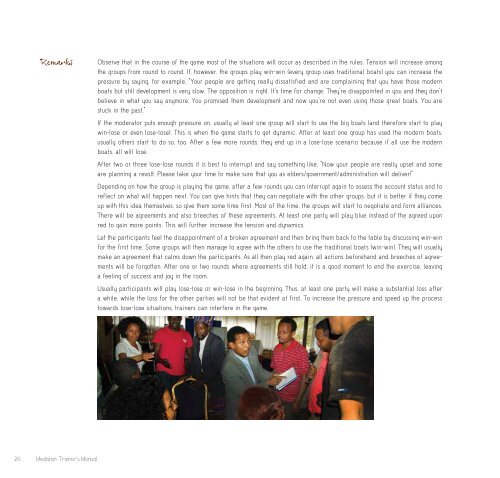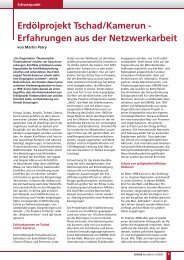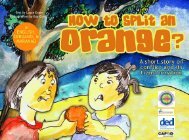Merging Ethiopian Wise-Counsel Mediation and Facilitative ...
Merging Ethiopian Wise-Counsel Mediation and Facilitative ...
Merging Ethiopian Wise-Counsel Mediation and Facilitative ...
- No tags were found...
You also want an ePaper? Increase the reach of your titles
YUMPU automatically turns print PDFs into web optimized ePapers that Google loves.
26 <strong>Mediation</strong> Trainer’s ManualObserve that in the course of the game most of the situations will occur as described in the rules. Tension will increase amongthe groups from round to round. If, however, the groups play win-win (every group uses traditional boats) you can increase thepressure by saying, for example, "Your people are getting really dissatisfied <strong>and</strong> are complaining that you have those modernboats but still development is very slow. The opposition is right. It's time for change. They're disappointed in you <strong>and</strong> they don'tbelieve in what you say anymore. You promised them development <strong>and</strong> now you're not even using those great boats. You arestuck in the past."If the moderator puts enough pressure on, usually at least one group will start to use the big boats (<strong>and</strong> therefore start to playwin-lose or even lose-lose). This is when the game starts to get dynamic. After at least one group has used the modern boats,usually others start to do so, too. After a few more rounds, they end up in a lose-lose scenario because if all use the modernboats, all will lose.After two or three lose-lose rounds it is best to interrupt <strong>and</strong> say something like, "Now your people are really upset <strong>and</strong> someare planning a revolt. Please take your time to make sure that you as elders/government/administration will deliver!"”Depending on how the group is playing the game, after a few rounds you can interrupt again to assess the account status <strong>and</strong> toreflect on what will happen next. You can give hints that they can negotiate with the other groups, but it is better if they comeup with this idea themselves, so give them some time first. Most of the time, the groups will start to negotiate <strong>and</strong> form alliances.There will be agreements <strong>and</strong> also breeches of these agreements. At least one party will play blue instead of the agreed uponred to gain more points. This will further increase the tension <strong>and</strong> dynamics.Let the participants feel the disappointment of a broken agreement <strong>and</strong> then bring them back to the table by discussing win-winfor the first time. Some groups will then manage to agree with the others to use the traditional boats (win-win). They will usuallymake an agreement that calms down the participants. As all then play red again, all actions beforeh<strong>and</strong> <strong>and</strong> breeches of agreementswill be forgotten. After one or two rounds where agreements still hold, it is a good moment to end the exercise, leavinga feeling of success <strong>and</strong> joy in the room.Usually participants will play lose-lose or win-lose in the beginning. Thus, at least one party will make a substantial loss aftera while, while the loss for the other parties will not be that evident at first. To increase the pressure <strong>and</strong> speed up the processtowards lose-lose situations, trainers can interfere in the game.
















